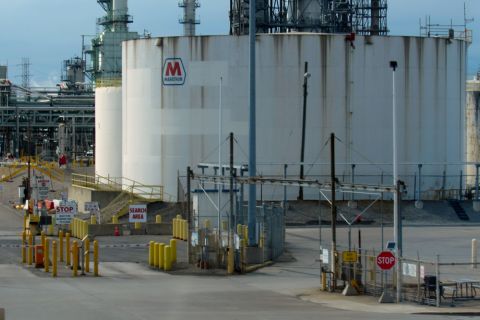Benchmark oil prices edged higher on March 27, boosted by further disruptions to Venezuela's crude exports which have helped tighten global inventories in recent weeks.
Brent added 13 cents, or 0.2%, to $68.10 a barrel by 0910 GMT, and was not far off its year-to-date high of $68.69 reached last week.
U.S. crude futures were however down 19 cents at $59.75 a barrel after a report that domestic crude inventories rose.
Venezuela's main oil export port of Jose and its four crude upgraders were unable to resume operations following a massive power blackout on Monday, the second in a month.
Crude exports from the key OPEC member have dropped sharply since Washington in January banned U.S. refiners from buying Venezuelan oil.
Prices have risen more than 25% this year, supported by supply curbs by the Organization of the Petroleum Exporting Countries and other major producers, along with U.S. sanctions on exports from Venezuela and Iran.
At the same time, short-term disruptions in the United States have also lent support.
The U.S. Coast Guard on March 25 reopened portions of the Houston Ship Channel with restrictions on waterways affected by a petrochemical leak and fire outside Houston that have disrupted ship traffic.
The disruptions to transport and refining operations will weigh heavily on U.S. inventories, Stephen Schork, editor of Pennsylvania-based The Schork Report, said in a note.
Also, crude flows from two key shale basins to the Cushing, Okla., delivery point for U.S. crude futures slowed in March due to winter production outages, dealers said.
U.S. prices were nevertheless weighed down by a report from the American Petroleum Institute that U.S. crude inventories rose 1.9 million barrels last week, while analysts had forecast a 1.2 million barrel-drop.
The market was awaiting weekly official figures from the Department of Energy (DoE) due later on March 27.
Brent crude traded in a relatively narrow range of $64 to $69 a barrel throughout March, reflecting the tension between tightening supplies and concerns over global demand.
"We seem to have reached a state of equilibrium after the recent headline-driven choppy trading, and we need to see some new impetus for price direction," said Jeff Halley, senior market analyst at OANDA in Singapore.
That is unlikely until a conclusion is reached in U.S.-China trade talks, he added, referring to negotiations due to restart on Thursday as the world's two largest economies seek to end an eight-month-old trade war.
Hedge funds and other money managers have increased bets that demand for oil will be sustained, even as the market rallied last week.
Recommended Reading
Marathon Petroleum Sets 2024 Capex at $1.25 Billion
2024-01-30 - Marathon Petroleum Corp. eyes standalone capex at $1.25 billion in 2024, down 10% compared to $1.4 billion in 2023 as it focuses on cost reduction and margin enhancement projects.
Humble Midstream II, Quantum Capital Form Partnership for Infrastructure Projects
2024-01-30 - Humble Midstream II Partners and Quantum Capital Group’s partnership will promote a focus on energy transition infrastructure.
BP’s Kate Thomson Promoted to CFO, Joins Board
2024-02-05 - Before becoming BP’s interim CFO in September 2023, Kate Thomson served as senior vice president of finance for production and operations.
Magnolia Oil & Gas Hikes Quarterly Cash Dividend by 13%
2024-02-05 - Magnolia’s dividend will rise 13% to $0.13 per share, the company said.
TPG Adds Lebovitz as Head of Infrastructure for Climate Investing Platform
2024-02-07 - TPG Rise Climate was launched in 2021 to make investments across asset classes in climate solutions globally.





